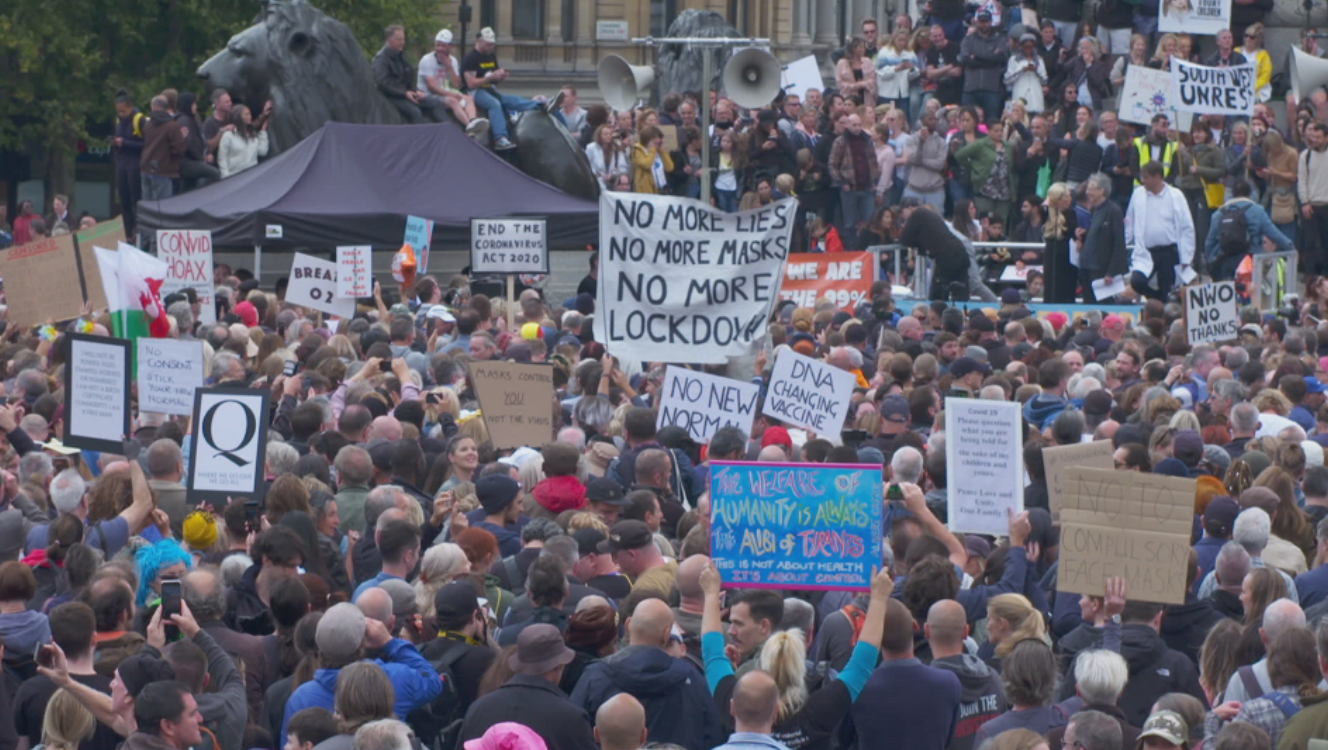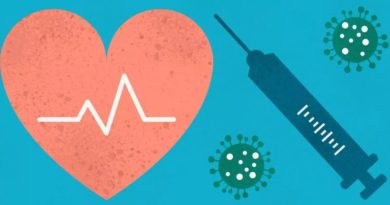‘Lies cost lives’: The anti-vax movement and its impact on Covid-19

So far more than 684,000 people have received their first dose of the coronavirus vaccine in Wales. The Welsh Government said over the last week, someone in Wales was vaccinated every five seconds.
Though many see the Covid-19 vaccine as the route out of the pandemic, a poll conducted by YouGov for ITV Wales found that 10% of people in Wales would refuse it. One reason for this could be misinformation.
53%
of Wales’ young people are seeing misleading content every day
With social media, fake news can spread faster and further than ever before. And it can affect the most vulnerable in our society.
Care home worker ‘Gwen’ said when her colleagues were first offered the Covid-19 vaccine, 50% did not want it.
She said: “Some felt it had been developed too soon. Others were concerned about the conspiracy theories that they read online.
“Considering what we went through the whole of last year in the nursing home, I was very shocked that they weren’t eager to end all of this. We had a lot of deaths in our nursing home. Everyone was really working hard and it was a really hard few months.
“Of those who’ve had the Covid vaccine, we’re all fine. None of us have had side effects, none of us are ill. Ok we had a few headaches and temperatures afterwards but all their fears our other staff have proven that they’re not true.”
Mario Kreft from Care Forum Wales said there have been nursing home staff across the country who are reluctant to get vaccinated.
“I think there are general concerns about this right across Wales. Some homes are doing incredibly well, we’ve heard stories of 100% take up but others are struggling.
“It only takes one person to bring this new strain of the virus into vulnerable people… I think everybody who works in social care should unless there’s a very good reason otherwise get the jab and importantly, be ready for a culture where we might have to have this each year for some years to come.”
One person ITV Wales spoke to, said they would refuse the vaccine because they believe their body would be able to fight off serious effects of the virus anyway.
Joanne Davies, who is a medical devices consultant from Blaenavon and not an expert on vaccines, believes that only the most vulnerable in society need the jab and having a plant-based diet means her body would be able to “inactivate the virus more effectively”.
Her views are unconventional and differ from the majority of scientific opinion.
The World Health Organisation says good general health may help some people recover better from coronavirus and diet is a part of that. However it suggests having a balanced diet, including food from animal sources.
of young people have seen their peers sharing misleading content (or fake news) online
The Centre for Countering Digital Hate said there is an “organised and disciplined anti-vax industry” operating. A report the nonprofit published found that “anti-vaxxers see Covid as an opportunity to drive long-term vaccine hesitancy.”
It said: “The total English-language audience for anti-vaxxers online has grown significantly in the past year and now stands at 59 million followers.
“Some anti-vaxxers are economically-motivated, some are true believers. Either way, to win, they need to undermine confidence in the scientific establishment.”
The organisation has offered some advice to tackle the issue:
-
Don’t overreact – just because you see it doesn’t mean it’s widely believed
-
Correct misinformation from family and friends privately
-
Spread pro-vaccine messages
-
Get vaccinated and get loud about it
The MHRA is the body which approves vaccines for use in the UK. Its Chief Executive said:
“Any vaccine must undergo robust clinical trials in line with international standards, with oversight provided by the Medicines and Healthcare products Regulatory Agency (MHRA).
“It’s important that people receive accurate and factual information regarding any medicine so that they can make an informed choice about whether it is suitable for them.
“This is particularly important at the moment, during the devastating COVID-19 pandemic, where the uptake of the approved vaccines has the potential to save many, many lives.”
No vaccine would be authorised for supply in the UK unless the expected standards of safety, quality and efficacy are met.
In order to tackle misinformation, the governments and Public Health Wales have been sharing facts online and out in communities and celebrities have been campaigning to raise awareness. But another group of people have been acting more under the radar – in the very spaces where conspiracy theories are spread.
‘Raynard’ is a member of a small group of individuals from all over the world who are “very interested in conspiracy theorists of all different kinds”.
We track their communications, their videos, we sometimes go undercover, and join in on their activities to learn what it is they’re up to.
He works as a computer programmer and sees his online anti-conspiracy theory group as a hobby. Other members of the group come from science and engineering backgrounds.
He said the group “stages interventions to expose individuals who are deliberately promoting dangerous conspiracy theories… and attempt to de-programme people who have been victims of conspiracy theories.”
‘Raynard’ said he believes some promoters of conspiracy theorists are “spreading crazy things, believe it or not, out of kindness.”
He added: “If you try and help people understand that everyone else, the scientists, the doctors, they’re not malicious people, that they are kind to people, it can soften people’s positions.
“You’re not going to get anywhere by getting in their face and telling them that they’re wrong… You might try and get them to soften their position, you might get them to maybe, let’s say if somebody believes that vaccines are the impending first wave and apocalypse, maybe you’ll get them to come to believe that vaccines aren’t that bad, or a little bit less bad than they originally thought.”
The Centre for Countering Digital Hate suggests people do not engage with anti-vaccine misinformation online.
For more, watch Wales This Week: Thursday at 7:30pm on ITV Cymru Wales.
Source

